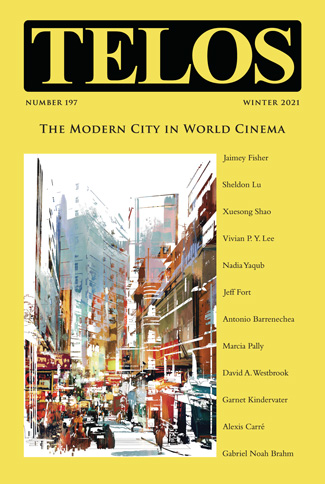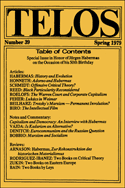In today’s episode of the Telos Press Podcast, David Pan talks with Vivian P.Y. Lee about her article “The City in Flux: Toward an Urban Topology of Hong Kong Cinema,” from Telos 197 (Winter 2021). An excerpt of the article appears here. In their conversation they discuss Hong Kong’s urban space and its cinematic reinventions; the relationship between cinematic space and disappearance; the cinematic lineage of Patrick Lung and John Woo, and their different depictions of modern urban institutions and individual heroes; the use of nostalgia in film to reveal darker realities of the dystopian present; how post-Umbrella Movement films have created new forms of production and distribution; the present and future of Hong Kong cinema; and the ways in which filmmakers have turned the city of Hong Kong into a protagonist. If your university has an online subscription to Telos, you can read the full article at the Telos Online website. For non-subscribers, learn how your university can begin a subscription to Telos at our library recommendation page. Print copies of Telos 197 are available for purchase in our online store.
|
In today’s episode of the Telos Press Podcast, David Pan talks with Xuesong Shao about her article “Restoring and Reimagining Socialist-Built Cities: Wang Xiaoshuai’s ‘Third Front Trilogy,’” from Telos 197 (Winter 2021). An excerpt of the article appears here. In their conversation they discuss the history of the Third Front Movement in China; how migration is depicted in Wang Xiaoshuai’s Third Front trilogy; the article’s approach to the issue of nostalgia; the relationship of nostalgia and ruination in Red Amnesia; the ways in which Wang Xiaoshuai uses the male gaze to reinforce gender stereotypes; the personal versus the historical in Eleven Flowers and how elusive personal recollections align with the master narratives of the nation-state; and the different ways that Wang Xiaoshaui and Jia Zhangke depict places of memory and places of history. If your university has an online subscription to Telos, you can read the full article at the Telos Online website. For non-subscribers, learn how your university can begin a subscription to Telos at our library recommendation page. Print copies of Telos 197 are available for purchase in our online store. Telos 197 (Winter 2021): The Modern City in World Cinema, edited by Jaimey Fisher and Sheldon Lu, is now available for purchase in our store. Individual subscriptions to Telos are also available in both print and online formats.
As an occasional feature on TELOSscope, we highlight a past Telos article whose critical insights continue to illuminate our thinking and challenge our assumptions. Today, Matt Applegate looks at Yvette Biro’s “The Intellectual Film: Eisenstein’s Plan to Film Marx’s Capital“ from Telos 39 (Spring 1979). |
||||
|
Telos Press Publishing · PO Box 811 · Candor, NY 13743 · Phone: 212-228-6479 Privacy Policy · Data Protection Copyright © 2024 Telos Press Publishing · All Rights Reserved |
||||

 It is difficult to think of what cinema is in the present, and indeed, what cinema might be in the future, outside of large studio systems, box office opening numbers, and global profit intake. Even so-called “independent” films often circulate in a virtual minor league of the Hollywood studio system, vying for wide release. To be sure, cinema’s thorough commodification both limits its potential for aesthetic experimentation and makes it easier to equate it with other forms of media. When cinema becomes secondary to the metrics of profit, its distinct aesthetic qualities are subordinate to its function as a product comprised of moving images and sound. Moreover, as film moves away from celluloid and toward digital formats, one is compelled to ask what makes cinema distinct as visual technology is homogenized. This is not to say that cinematic experience and practice are bankrupt aesthetic qualities or that film is doomed to devolve into an indistinct mesh of CGI and user-generated websites like YouTube and Vine. Rather, as Yvette Biro suggests in her “The Intellectual Film: Eisenstein’s Plan to Film Marx’s Capital,” the horizon of cinematic thought and practice is perhaps best imagined by examining the relation between ideology and cinematic aesthetics.
It is difficult to think of what cinema is in the present, and indeed, what cinema might be in the future, outside of large studio systems, box office opening numbers, and global profit intake. Even so-called “independent” films often circulate in a virtual minor league of the Hollywood studio system, vying for wide release. To be sure, cinema’s thorough commodification both limits its potential for aesthetic experimentation and makes it easier to equate it with other forms of media. When cinema becomes secondary to the metrics of profit, its distinct aesthetic qualities are subordinate to its function as a product comprised of moving images and sound. Moreover, as film moves away from celluloid and toward digital formats, one is compelled to ask what makes cinema distinct as visual technology is homogenized. This is not to say that cinematic experience and practice are bankrupt aesthetic qualities or that film is doomed to devolve into an indistinct mesh of CGI and user-generated websites like YouTube and Vine. Rather, as Yvette Biro suggests in her “The Intellectual Film: Eisenstein’s Plan to Film Marx’s Capital,” the horizon of cinematic thought and practice is perhaps best imagined by examining the relation between ideology and cinematic aesthetics. 






